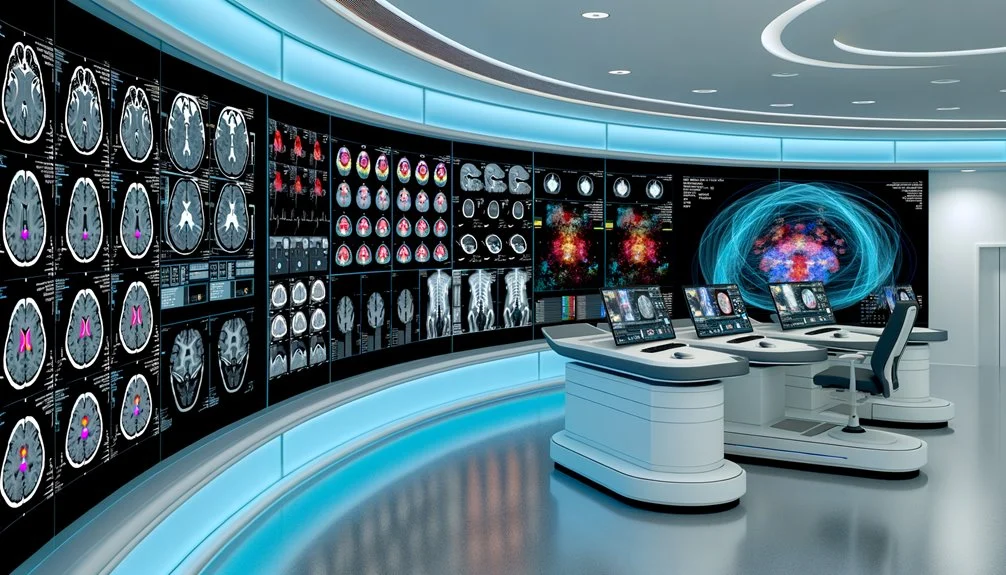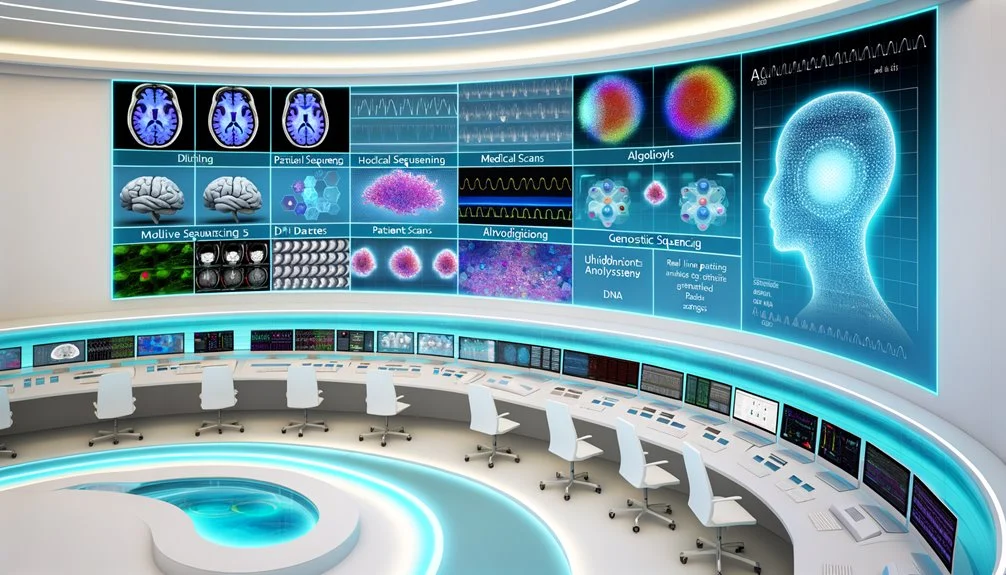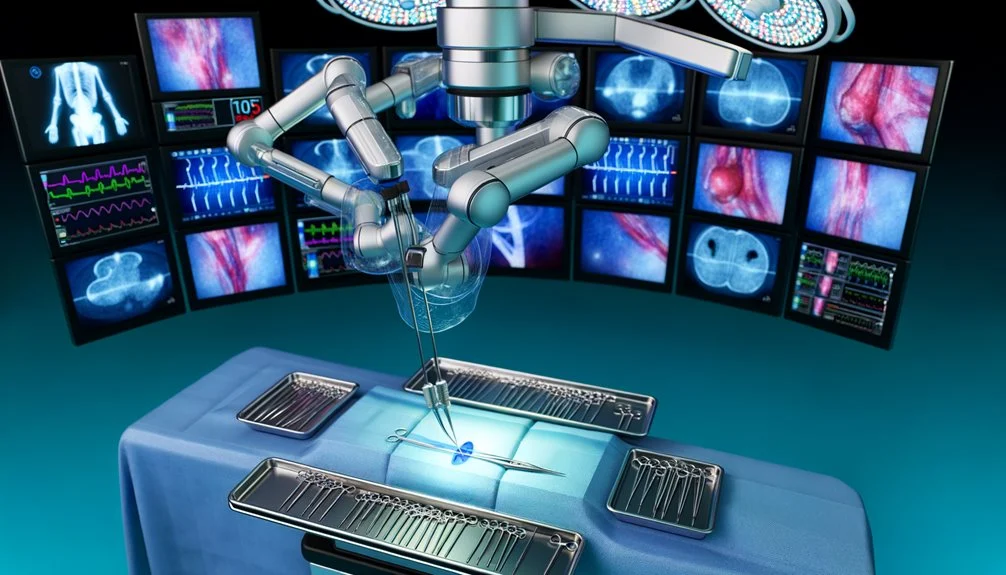AI Applications in Healthcare. AI revolutionizes healthcare through key applications like medical imaging analysis, predictive analytics, and virtual health assistants. These technologies enhance diagnosis accuracy, streamline operations, and improve patient care. AI-powered systems assist in drug discovery, robotic surgery, and personalized treatment planning. The technology manages patient data securely while optimizing healthcare resources. The market for healthcare AI continues expanding, with innovations transforming patient outcomes across multiple medical domains.
Key Takeaways
- AI-powered medical imaging systems enhance disease detection and diagnosis through deep learning algorithms that process large datasets efficiently.
- Predictive analytics combines AI and machine learning to enable early disease detection and create personalized treatment plans for patients.
- Virtual health assistants use machine learning to analyze patient data, provide recommendations, and improve care delivery and monitoring.
- AI automates healthcare workflows and optimizes resource allocation, potentially saving billions in administrative costs across the industry.
- AI platforms accelerate drug discovery processes while surgical robots enhance procedural accuracy, with both markets showing significant growth potential.
AI Applications in Healthcare Medical Imaging Analysis and Diagnostic Support

As artificial intelligence continues transforming healthcare, medical imaging analysis stands at the forefront of innovation. AI algorithms now help doctors detect and diagnose conditions like cancer, brain disorders, and heart problems with improved accuracy. The technology enhances image quality and speeds up analysis, leading to earlier disease detection and better patient outcomes.
Deep learning techniques are revolutionizing how medical professionals interpret MRI and CT scans. These AI systems can process large amounts of imaging data quickly, helping to identify patterns that might be missed by human eyes. The market for AI in medical imaging is growing rapidly, expected to reach $14.64 billion by 2029. The neurology segment dominates the medical imaging AI market, with advanced algorithms analyzing brain scans for enhanced diagnosis. Generative AI tools are now being integrated into medical information systems to assist with patient summarizations and streamline diagnostic workflows.
AI-powered deep learning is transforming medical imaging, with rapid data processing capabilities that surpass human detection of subtle patterns.
While AI shows great promise, challenges remain. The technology needs proper testing and oversight to guarantee reliability. Data privacy and security are also important concerns.
Despite these challenges, AI’s role in medical imaging continues to expand, making healthcare more efficient and accurate.
AI Applications in Healthcare Predictive Healthcare Analytics

Building on advancements in medical imaging, predictive healthcare analytics represents another powerful AI application transforming modern medicine. This rapidly growing field, valued at $18.13 billion in 2024, combines AI and machine learning to turn healthcare data into useful predictions.
The technology helps doctors detect diseases earlier and create personalized treatment plans for patients. It can predict medication side effects, forecast disease outbreaks, and speed up new drug development. Healthcare facilities use these tools to manage their resources better, like scheduling staff and managing hospital beds. Early detection through predictive analytics has shown up to 48% improvement rates in disease identification. With current data volumes, these systems process approximately 32% of global data from healthcare sources alone.
The system works by analyzing data from various sources, including electronic health records and wearable devices. It uses this information to identify patterns and predict future health events. Computational statistics help analyze massive amounts of genetic data to improve clinical trial outcomes.
This shift from reactive to preventive care is improving patient outcomes and making healthcare more efficient. As the technology continues to evolve, it’s expected to reach $156.36 billion by 2034.
Virtual Health Assistants and Patient Support

Virtual health assistants represent the next frontier in patient care, combining AI technology with personalized support. These AI-powered systems are revolutionizing healthcare delivery, with the market expected to grow from $1.03 billion in 2023 to $19.2 billion by 2035. Smart speakers dominate the current market with over 40% share, offering hands-free capabilities that enhance patient monitoring and care delivery. The expansion of e-health and m-health solutions has created enhanced patient engagement across multiple healthcare touchpoints.
With machine learning approaches driving continuous improvements, virtual health assistants are becoming increasingly sophisticated in their ability to analyze patient data and provide personalized recommendations.
They’re making healthcare more accessible and efficient through 24/7 communication channels and automated support services.
Key benefits of virtual health assistants include:
- Patient Care Management – They provide medication reminders, appointment scheduling, and chronic disease management support.
- Operational Efficiency – These systems reduce medical staff workload by automating routine tasks and streamlining administrative processes.
- Healthcare Integration – Virtual assistants connect with electronic health records and support teleconsultations.
While challenges like data privacy and complex task handling exist, ongoing technological advancements in AI and natural language processing continue to enhance virtual health assistants’ capabilities, making them increasingly valuable in modern healthcare delivery.
Automated Administrative Workflows

Modern healthcare facilities are increasingly adopting automated administrative workflows to streamline operations beyond patient-facing virtual assistants. AI systems are revolutionizing tasks like claims processing, data management, and regulatory compliance, leading to significant cost reductions and improved efficiency. Predictive analytics capabilities help facilities forecast resource needs and optimize staffing levels more accurately.
Studies show that AI automation can save up to $150 billion annually in U.S. healthcare administrative costs. Tools like AtlantiCare’s system help providers save over an hour daily on documentation. These systems use advanced technologies like machine learning and natural language processing to manage large datasets while maintaining data quality and security.
AI automation in healthcare administration could reduce costs by billions while saving providers valuable time through smart documentation systems.
While implementation challenges exist, including data privacy concerns and integration complexities, healthcare organizations continue to embrace AI solutions. The technology supports decision-making processes, reduces errors, and optimizes workflows across facilities. Ambient listening technology is being implemented to significantly reduce clinical documentation workload for healthcare providers.
As AI systems evolve, they’re expected to drive digital transformation while ensuring seamless interoperability with existing healthcare infrastructure, ultimately improving both administrative efficiency and patient care delivery.
Precision Medicine and Treatment Planning

As healthcare continues to evolve, precision medicine powered by AI is transforming how doctors treat patients. AI systems analyze complex data like genetics, proteins, and other biological markers to help create personalized treatment plans. These advanced tools are especially important in cancer care, where they’ve helped improve survival rates by starting treatments sooner.
Here’s how AI makes precision medicine more effective:
- AI examines genetic information and medical images to identify diseases faster than traditional methods, reducing diagnosis time from weeks to minutes.
- Smart algorithms predict how well a patient might respond to different treatments, helping doctors choose the most effective options.
- AI-powered systems monitor patient progress over time and can spot potential problems before they become serious.
The technology also helps make healthcare more accessible while keeping patient data secure and private. Digital pathology and AI analysis are enabling same-day treatment initiation for many conditions. Despite some regulatory challenges, AI continues to advance precision medicine capabilities. According to a recent survey, nearly two-thirds of physicians acknowledge the potential advantages of incorporating AI into healthcare practices. With the rapid evolution of data visualization tools, healthcare providers can now present complex medical data to patients in clear, understandable formats.
Drug Discovery and Development

The pharmaceutical industry is witnessing a remarkable shift through AI-powered drug discovery and development. AI platforms like Exscientia’s Centaur Chemist are transforming how new medicines are created, reducing development time from five years to just 12-18 months. Traditional drug development requires fourteen years on average to complete the entire process.
The market for AI in drug discovery, currently valued at $1.72 billion, is expected to reach $8.53 billion by 2030. These AI systems can cut drug discovery costs by up to 40% while improving success rates. They’re particularly effective at screening potential drug molecules and predicting their behavior. North America leads with more than 43% of the global AI drug discovery market share. Like hash tables in data structures, AI systems enable rapid retrieval and analysis of vast molecular databases.
Generative AI, using advanced machine learning models, helps scientists design new medications and simulate complex biological systems. This technology supports the creation of personalized cancer treatments and helps identify promising drug candidates for various diseases.
The impact is significant, with AI in pharmaceuticals projected to generate up to $410 billion annually by 2025.
AI-Enhanced Robotic Surgery

Surgical robots equipped with artificial intelligence are revolutionizing operating rooms worldwide. These advanced systems combine AI capabilities with precise robotic controls, helping surgeons perform complex procedures with enhanced accuracy.
The global surgical robotics market is expected to grow from $11 billion in 2024 to $30 billion by 2031, driven by increasing adoption and technological improvements.
The surgical robotics industry is poised for massive growth, with market value projected to nearly triple within seven years.
- AI-powered robots provide real-time imaging and analysis during surgery, helping surgeons make better decisions and avoid complications.
- Haptic feedback technology lets surgeons feel what they’re doing, making procedures safer and more precise.
- Minimally invasive robotic surgeries lead to faster recovery times, less pain, and reduced infection risks for patients.
Hospital adoption rates are rising quickly, with usage increasing from 1.8% to 15.1% across general surgery procedures.
Teaching hospitals lead the way, with 84.9% now using robotic surgery techniques, showing strong confidence in this technology’s benefits.
Specialized training requirements for surgical staff have become a critical focus as more hospitals implement robotic systems.
Major companies like Stryker and Intuitive Surgical are integrating Case Insights and Blueprint AI tools to analyze surgical procedures and provide valuable feedback to surgeons.
Patient Data Management and Security

While robotic surgery systems handle physical operations, managing patient data safely presents its own set of challenges in modern healthcare. Healthcare organizations use AI systems to integrate fragmented data sources and generate valuable insights while protecting sensitive information.
AI tools help analyze real-world patient data and create predictive models for better health outcomes. These systems can visualize complex health information, making it easier for doctors to make informed decisions. However, this data analysis must follow strict privacy rules like HIPAA and GDPR. As healthcare facilities scale up their AI implementation, 75% of leading companies are planning expanded use cases.
To keep patient information secure, healthcare facilities use various protection methods. These include data encryption, strict access controls, and special techniques to prevent unauthorized access. With 57% of leaders expressing serious concerns about data security and patient privacy, healthcare organizations are implementing increasingly sophisticated protection measures.
They also maintain detailed records of how AI systems use patient data. As healthcare continues to digitize, organizations must balance the benefits of AI-driven insights with robust security measures to protect patient privacy.
Personalized Care Pathways

Modern healthcare has evolved beyond one-size-fits-all treatments thanks to AI-powered personalized care pathways. These systems use machine learning to analyze patient data, including medical history, genetics, and lifestyle factors, to create custom treatment plans that work better for each person.
AI algorithms help doctors make better decisions by connecting real-time patient information with vast medical databases. They can predict how diseases might progress and suggest the most effective treatments while reducing unwanted side effects. Studies demonstrate that AI-driven systems significantly improve how well patients understand and manage their health conditions. Enhanced EHR capabilities now enable clinicians to deliver more intentional and individualized patient care.
Here’s how AI personalizes patient care:
- Creates individual treatment plans by analyzing thorough health data and genetic profiles
- Monitors patient progress continuously and adjusts recommendations automatically
- Delivers customized educational content and reminders to keep patients engaged in their care
This technology makes healthcare more efficient by reducing unnecessary tests and identifying effective treatments faster, leading to better outcomes at lower costs.
Healthcare Resource Optimization

Healthcare organizations are turning to AI-powered resource optimization to maximize efficiency and improve patient care. AI systems analyze vast amounts of operational data to identify bottlenecks, predict patient demand, and optimize workflow processes.
These intelligent systems create digital twins of hospital operations, allowing administrators to simulate changes before implementation. They automate routine tasks like billing and coding, which reduces costs and minimizes errors. The technology also helps predict staffing needs and equipment requirements, ensuring resources are available when needed. Modular design principles enable these systems to function independently while maintaining seamless integration.
AI-driven analytics monitor patient flow in real-time, helping reduce wait times and improve facility throughput. The systems track bed occupancy, procedure room usage, and staff availability to enhance coordination between departments. With robust data governance, healthcare facilities can ensure the accuracy and reliability of their AI-driven resource optimization efforts. The market for AI-powered healthcare solutions is expected to reach $613.81 billion by 2034, driving widespread adoption of resource optimization tools.
Through interactive dashboards, healthcare leaders can access performance metrics and make data-driven decisions about resource allocation. This thorough approach to resource management leads to better operational efficiency and improved patient outcomes.
Frequently Asked Questions
How Long Does It Take to Train Healthcare Staff on AI Systems?
Training duration for healthcare staff on AI systems varies from hours for basic literacy to several months for specialized roles, with ongoing updates required due to rapid technological advancements.
What Happens if AI Systems Make Incorrect Medical Recommendations?
Incorrect AI medical recommendations can result in delayed treatments, worsened patient conditions, financial burdens, and emotional distress. This can also lead to legal liability issues and eroded trust in healthcare systems.
Can Patients Opt Out of Ai-Assisted Healthcare Services?
Patients maintain legal rights to opt out of AI-assisted healthcare. Healthcare providers must offer clear alternatives, inform patients when AI is used, and respect patient decisions regarding AI participation in their care.
How Much Do Healthcare AI Solutions Typically Cost to Implement?
Healthcare AI implementation costs vary greatly, ranging from $50,000 for basic automation to over $10 million for complex solutions, with extra annual expenses for infrastructure, training, and maintenance.
Are AI Healthcare Systems Available in Rural or Remote Medical Facilities?
While rural facilities increasingly access AI healthcare systems through mobile clinics and telemedicine, availability remains limited. ARPA-H’s $25 million investment aims to expand these essential technological resources nationwide.
Conclusion
AI in healthcare is transforming patient care and medical operations. Research shows that AI-powered medical imaging can detect diseases with up to 95% accuracy, often outperforming human doctors. From virtual health assistants to robotic surgery, these technologies aren’t just making healthcare more efficient – they’re saving lives. As AI continues to evolve, it’s creating a future where personalized, precise medical care is the norm.


